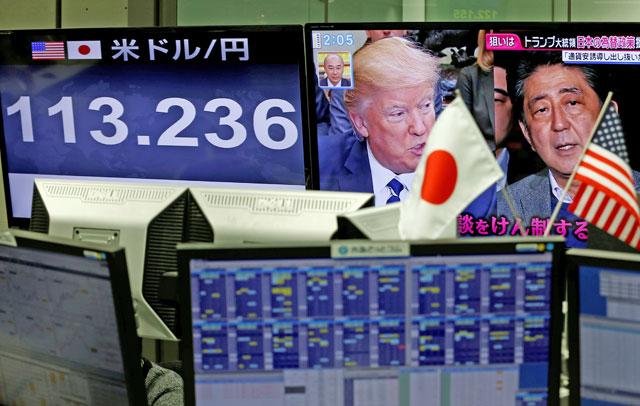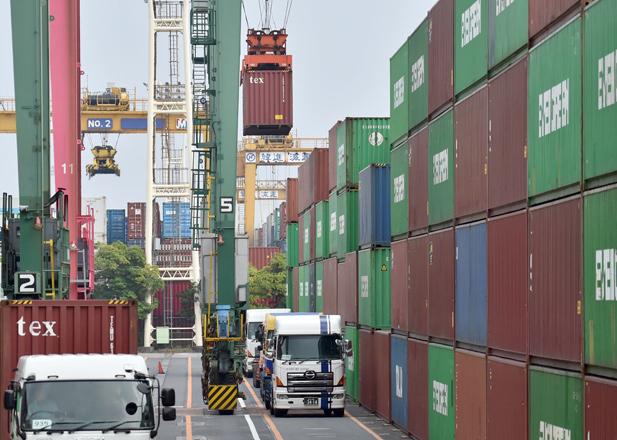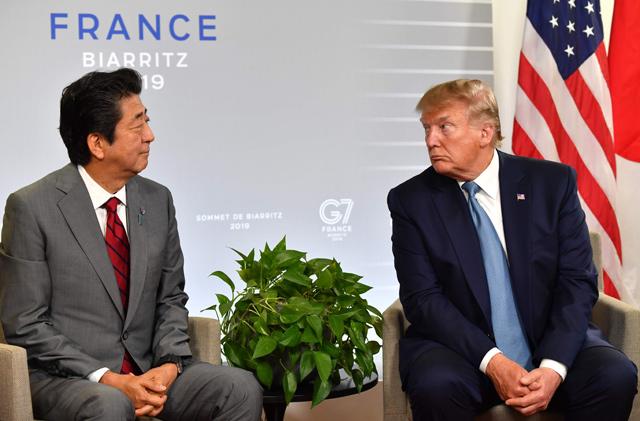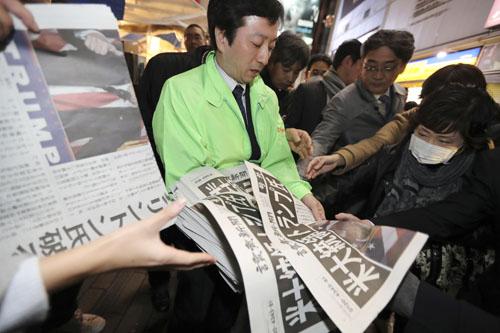You are here
Fairway diplomacy: Abe putting hope in golf with Trump
By AFP - Feb 08,2017 - Last updated at Feb 08,2017

A TV monitor showing US President Donald Trump and Japanese Prime Minister Shinzo Abe is seen next to another monitor showing the Japanese yen's exchange rate against the US dollar, at a foreign exchange trading company in Tokyo, on February 1 (Reuters photo)
TOKYO — Shinzo Abe heads to the US on Thursday — and to a game of golf with Donald Trump — teeing off a drive to keep Japan's most important relationship out of the rough.
After a formal summit in Washington, the Japanese prime minister is expected to board Air Force One with the new US president and jet off to Florida for some time together on the links.
For Abe, a round of golf could be an opportunity to avoid the hazards that other world leaders have encountered in their dealings with the unconventional commander-in-chief.
"So far, Trump has described Japan as if it is an imagined enemy," said Fumiaki Kubo, an expert on US politics at the University of Tokyo.
The idea of meeting in person "is better than fighting during a phone conversation," he said, alluding to reports of the heated call between Trump and Australian Prime Minister Malcolm Turnbull, which by some accounts ended abruptly.
"You can't escape a conversation by hanging up the phone inside Air Force One," Kubo said, noting that spending such a long time with Trump would be a chance for Abe to brief him about the basic facts of the Japan-US relationship.
In the more than seven decades since defeat in World War II, Japan has risen to become a steadfast ally of the United States.
There are 47,000 US service personnel based in Japan, providing protection for their hosts and offering an invaluable forward position in East Asia for the Americans.
The two countries enjoy a huge trade relationship — goods and services worth about $200 billion pass between them every year.
But Trump's unorthodox White House run was built, in part, on throwing shade on relations with friends and enemies alike.
The former reality TV star, in comments to business executives, has assailed Japan for allegedly devaluing the yen, grouping it with other countries he says are taking "advantage" of the US.
'Friendly nation'
Japanese companies have also felt his ire on Twitter, with car behemoth Toyota getting an earbashing over a planned factory in Mexico.
Perhaps most worryingly for many Japanese, Trump suggested during his campaign Tokyo was not paying its fair share for the huge US military presence, hinting that he might pull American troops and saying Japan should develop its own nuclear deterrent.
At a time of rising uncertainty caused by an unpredictable North Korea and China's increasing willingness to press its case in territorial and other regional disputes, that unsettled Tokyo.
Despite a professed willingness to bolster their own military, the hawkish Abe and his supporters know a US drawdown would badly upend East Asia and leave Japan vulnerable.
In the immediate aftermath of Trump's shock election victory last November, Abe hurried to New York, becoming the first global leader to meet the president-elect.
The meeting, at Trump's gilded Manhattan penthouse, seemed to go off well.
Abe presented Trump with a golf driver, reportedly worth around $4,500, and met daughter Ivanka and her husband Jared Kushner, both seen as having the president's ear.
But if the prime minister was hoping for an immediate return on his investment, he might have been disappointed.
Within days of taking the Oval Office, Trump yanked the US from the Trans-Pacific Partnership (TPP), a complex free-trade agreement in which Abe had invested a lot of political capital.
The move fulfilled a campaign promise for the property baron-turned-president, but left allies in Asia spinning; the TPP was an economic guarantee of US committment to the region.
Undeterred, Abe has tried to keep things on an even keel, holding his counsel on some of Trump's more divisive moves even as allies like Germany openly frown at his controversial ban on refugees.
And when he heads to Washington for their official meeting on Friday, Abe will come bearing gifts: an economic cooperation package that reportedly includes plans to help create 700,000 US jobs through Japanese investment in American infrastructure.
Showing a commitment to US employment — a key campaign promise of the president — is "part of Japan's efforts to explain to Trump that it is a friendly nation" not just in security but also economics, said Mikitaka Masuyama, professor of politics at the National Graduate Institute for Policy Studies.
But for all the economic quid pro quo with this most transactional of US presidents, the one-on-one that time on the golf course offers could be Abe's best bet for building a stronger relationship.
Trump agrees.
"That's the one thing about golf — you get to know somebody better on a golf course than you will over lunch," the president told Westwood One Sports Radio in the US.
"We're going to have a lot of fun."
Related Articles
TOKYO — Japan's politically sensitive trade surplus with the United States grew more than 15 per cent in July, data showed on Monday, as neg
BIARRITZ, France — US President Donald Trump and Japan's Prime Minister Shinzo Abe on Sunday announced a deal in principle on a major bilate
TOKYO/SEOUL — Republican Donald Trump's victory in the US presidential election will deepen Asian allies' anxiety about Washington's commitm














